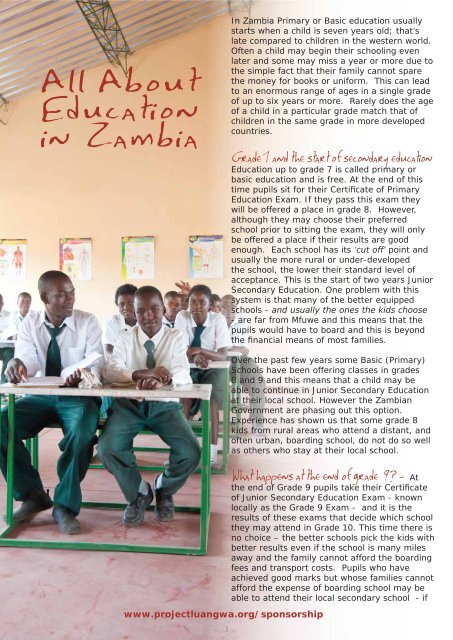A Guide to Pupil Sponsorship 2013
Create successful ePaper yourself
Turn your PDF publications into a flip-book with our unique Google optimized e-Paper software.
All About<br />
Education<br />
in Zambia<br />
www.projectluangwa.org/sponsorship<br />
3<br />
In Zambia Primary or Basic education usually<br />
starts when a child is seven years old; that’s<br />
late compared <strong>to</strong> children in the western world.<br />
Often a child may begin their schooling even<br />
later and some may miss a year or more due <strong>to</strong><br />
the simple fact that their family cannot spare<br />
the money for books or uniform. This can lead<br />
<strong>to</strong> an enormous range of ages in a single grade<br />
of up <strong>to</strong> six years or more. Rarely does the age<br />
of a child in a particular grade match that of<br />
children in the same grade in more developed<br />
countries.<br />
Grade 7 and the start of secondary education<br />
Education up <strong>to</strong> grade 7 is called primary or<br />
basic education and is free. At the end of this<br />
time pupils sit for their Certifi cate of Primary<br />
Education Exam. If they pass this exam they<br />
will be offered a place in grade 8. However,<br />
although they may choose their preferred<br />
school prior <strong>to</strong> sitting the exam, they will only<br />
be offered a place if their results are good<br />
enough. Each school has its ‘cut off’ point and<br />
usually the more rural or under-developed<br />
the school, the lower their standard level of<br />
acceptance. This is the start of two years Junior<br />
Secondary Education. One problem with this<br />
system is that many of the better equipped<br />
schools - and usually the ones the kids choose<br />
- are far from Mfuwe and this means that the<br />
pupils would have <strong>to</strong> board and this is beyond<br />
the fi nancial means of most families.<br />
Over the past few years some Basic (Primary)<br />
Schools have been offering classes in grades<br />
8 and 9 and this means that a child may be<br />
able <strong>to</strong> continue in Junior Secondary Education<br />
at their local school. However the Zambian<br />
Government are phasing out this option.<br />
Experience has shown us that some grade 8<br />
kids from rural areas who attend a distant, and<br />
often urban, boarding school, do not do so well<br />
as others who stay at their local school.<br />
What ha pens at the end of grade 9? - At<br />
the end of Grade 9 pupils take their Certifi cate<br />
of Junior Secondary Education Exam - known<br />
locally as the Grade 9 Exam - and it is the<br />
results of these exams that decide which school<br />
they may attend in Grade 10. This time there is<br />
no choice – the better schools pick the kids with<br />
better results even if the school is many miles<br />
away and the family cannot afford the boarding<br />
fees and transport costs. <strong>Pupil</strong>s who have<br />
achieved good marks but whose families cannot<br />
afford the expense of boarding school may be<br />
able <strong>to</strong> attend their local secondary school - if


